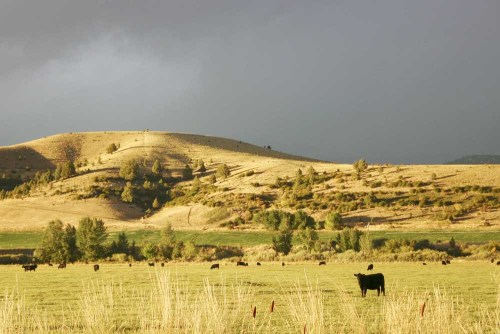Judge curtails grazing in Hammond case
Published 5:23 pm Tuesday, July 16, 2019

- Hammond Ranches was recently re-authorized to use grazing allotments in Eastern Oregon, but an environmental lawsuit seeks to overturn that decision.
PORTLAND — U.S. District Judge Michael Simon has ruled environmental groups are likely to prevail in their claim that former Interior Secretary Ryan Zinke improperly renewed a grazing permit lost by Dwight and Steven Hammond due to setting fire to rangelands.
Western Watersheds Project, Center for Biological Diversity and Wildearth Guardians have shown the renewal decision was likely “arbitrary and capricious” because Zinke didn’t evaluate the father-and-son’s prior non-compliance incidents or whether they’d be “good stewards of the land,” among other requirements, the judge said.
Trending
The judge entered a preliminary injunction limiting grazing as requested by the environmental plaintiffs, though the Hammonds’ cattle can still graze one public land allotment under an amended plan suggested by the U.S. Bureau of Land Management.
Under the order, cattle can consume 30 percent of the forage available on 6,000 acres of the Hardie Summer allotment, down from 50 percent under the Hammonds’ permit, and cannot graze at all on the 8,200-acre Mud Creek allotment except when briefly traveling through it.
One of the pastures within the Hardie Summer allotment will also be off-limits to grazing and the BLM must conduct monthly monitoring of rangeland conditions on the allotment, with its findings submitted to the judge in October.
Dwight and Steven Hammond were ultimately convicted of setting a fire in 2001 that consumed 139 acres of federal property, while the younger rancher was also found guilty of lighting a “back burn” that spread onto an acre of public land in 2006.
A federal judge originally imposed prison terms of three months for Dwight Hammond and a year for Steven Hammond after finding the five-year mandatory terms required under federal law “really would shock the conscience.”
The 9th U.S. Circuit Court of Appeals overturned that decision and the ranchers were required to serve the full five years behind bars.
Trending
They returned to prison in early 2016 — inspiring a notorious standoff between protesters and the government at the Malheur National Wildlife Refuge — but were fully pardoned and released a year ago by President Donald Trump. Apart from their problems in criminal court, the BLM refused to renew the Hammonds’ grazing permit in 2014 based on their criminal convictions, citing the ranchers’ “disregard for human life and public property.”
However, early this year, Zinke found that the pardons represented “unique and important changed circumstances” that, along with Hammonds’ time behind bars and civil penalties, justified restoring the grazing permit.
The environmental plaintiffs filed a complaint challenging that decision, arguing that Zinke hadn’t followed federal land management law and associated regulations in making the decision. The groups also claimed they’d suffer irreparable harm from grazing impacts to the Greater sage grouse and redband trout.
Simon has now agreed that Zinke didn’t follow procedures for renewing a grazing permit under the Federal Land Policy and Management Act and also that the renewal was improperly excluded from environmental review under the National Environmental Policy Act. While the judge agreed that it’s likely the environmentalist have shown “irreparable harm” to the sage grouse from grazing levels under the Hammonds’ permit, he determined the reduced grazing plan wouldn’t result in such damage.
Likewise, Simon said he was persuaded that grazing under the permit would likely cause irreparable harm to riparian areas upon which redband trout depend, though that was not the case under the BLM’s amended plan.









